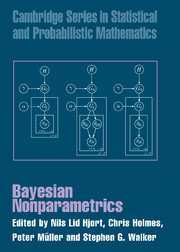Book contents
- Frontmatter
- Contents
- List of contributors
- An invitation to Bayesian nonparametrics
- 1 Bayesian nonparametric methods: motivation and ideas
- 2 The Dirichlet process, related priors and posterior asymptotics
- 3 Models beyond the Dirichlet process
- 4 Further models and applications
- 5 Hierarchical Bayesian nonparametric models with applications
- 6 Computational issues arising in Bayesian nonparametric hierarchical models
- 7 Nonparametric Bayes applications to biostatistics
- 8 More nonparametric Bayesian models for biostatistics
- Author index
- Subject index
3 - Models beyond the Dirichlet process
Published online by Cambridge University Press: 06 January 2011
- Frontmatter
- Contents
- List of contributors
- An invitation to Bayesian nonparametrics
- 1 Bayesian nonparametric methods: motivation and ideas
- 2 The Dirichlet process, related priors and posterior asymptotics
- 3 Models beyond the Dirichlet process
- 4 Further models and applications
- 5 Hierarchical Bayesian nonparametric models with applications
- 6 Computational issues arising in Bayesian nonparametric hierarchical models
- 7 Nonparametric Bayes applications to biostatistics
- 8 More nonparametric Bayesian models for biostatistics
- Author index
- Subject index
Summary
Bayesian nonparametric inference is a relatively young area of research and it has recently undergone a strong development. Most of its success can be explained by the considerable degree of flexibility it ensures in statistical modeling, if compared to parametric alternatives, and by the emergence of new and efficient simulation techniques that make nonparametric models amenable to concrete use in a number of applied statistical problems. This fast growth is witnessed by some review articles and monographs providing interesting and accurate accounts of the state of the art in Bayesian nonparametrics. Among them we mention the discussion paper by Walker, Damien, Laud and Smith (1999), the book by Ghosh and Ramamoorthi (2003), the lecture notes by Regazzini (2001) and the review articles by Hjort (2003) and Müller and Quintana (2004). Here we wish to provide an update to all these excellent works. In particular, we focus on classes of nonparametric priors that go beyond the Dirichlet process.
Introduction
The Dirichlet process has been a cornerstone in Bayesian nonparametrics since the seminal paper by T. S. Ferguson appeared in the Annals of Statistics in 1973. Its success can be partly explained by its mathematical tractability and it has grown tremendously with the development of Markov chain Monte Carlo (MCMC) techniques whose implementation allows a full Bayesian analysis of complex statistical models based on the Dirichlet process prior.
- Type
- Chapter
- Information
- Bayesian Nonparametrics , pp. 80 - 136Publisher: Cambridge University PressPrint publication year: 2010
- 107
- Cited by



